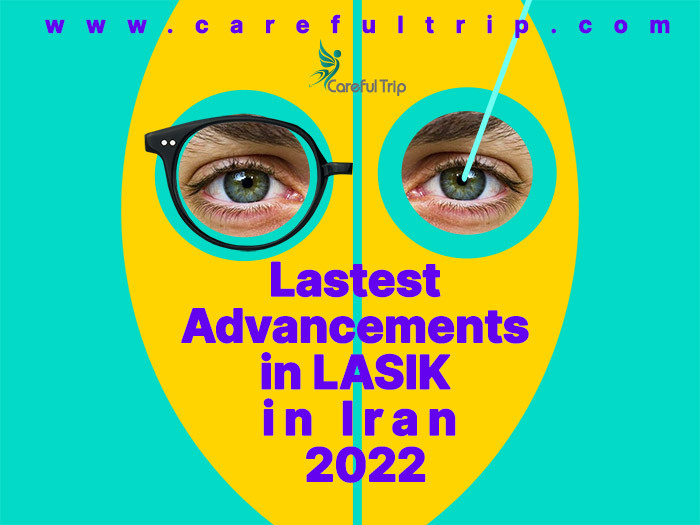LASIK eye surgery is one of the most common procedures that uses a laser to correct refractive vision errors such as myopia (nearsightedness), hyperopia (farsightedness), and astigmatism. This procedure permanently reshapes and contours the cornea to help it bend the light correctly right to the center of the retina. A blade or laser device (a laser keratome) is used to cut a paper-thin flap of the cornea’s surface tissue, correct refractive vision errors, and improve the way light rays enter the retina using an excimer laser. Getting surgery for LASIK in Iran ensures you a safe and cost-effective treatment under the administration of competent ophthalmologists and surgeons.
For more information, read:

LASIK Candidates
Although only your ophthalmologist can suggest and determine the best kind of treatment for you, as general criteria, for undergoing LASIK in Iran, you should meet the following requirements:
- Your doctor should confirm that your refractive error can be treated with LASIK surgery
- You should be over 18 (sometimes your doctor might suggest undergoing the operation when you are over 21, as after this age your glasses/contacts prescription is less likely to change)
- Your glasses/contacts prescription should have been stable over the last 12 months before the surgery; otherwise, your condition might reverse or worsen after the procedure
- Your overall eye health must be good
- The doctor should indicate that your cornea is thick enough to perform the LASIK surgery
You might not be a suitable candidate for LASIK if you meet the following criteria:
- You are pregnant, nursing, or have uncontrolled diabetes. These conditions might prevent you from undergoing LASIK as they can lead to hormonal imbalances and fluctuations
- You have extreme levels of myopia, hyperopia, or astigmatism
- You have specific eye conditions such as severe dry eyes, corneas that are too thin, corneal abrasion, and erosion (a condition in which the surface of your cornea is scraped), advanced glaucoma, cataract, and having a history of recurrent eye infections.
Please keep in mind to inform your ophthalmologist about any medical history and underlying issues. It is also worth mentioning that only your doctor can decide on the best refractive vision correction method for you. This can depend on your health conditions and your lifestyle choices. For example, suppose you have a very active lifestyle, play sports, or have a job that might include trauma to the eyes. In that case, your ophthalmologist might suggest performing PRK surgery instead of LASIK.

How Is LASIK Performed?
Before the Surgery
You will need to visit your doctor on multiple sessions to discuss the procedure and its aftercare process. Through these appointments, he will answer any questions regarding the operation and will discuss your expectations for the LASIK procedure. May patients expect to have a 20/20 vision after the surgery, but the doctor might indicate that they will still need their glasses or contacts while performing certain activities such as reading or driving. Generally, your doctor will do the following process before performing the procedure:
- He will create a detailed map of your vision using gears such as WaveScan or a Wavefront analysis to have a clear idea of your refractive errors and create a “fingertip” of your cornea that is unique to you. These maps will be uploaded to the computer that operates the laser and helps your surgeon detect the exact sites that need correction.
- He will also check for other possible eye problems that might interfere with your surgery
- Your pupil size will also be measured
For more information, read:
During the Procedure
LASIK in Iran is an outpatient surgery that can be done either in your doctor’s office or an eye hospital. The whole operation will be approximately 30 minutes. Your ophthalmologist will first numb your eye during the surgery using special eye drops. Then, he will place an eyelid holder to prevent you from blinking. This will cause your vision to go dim. At this stage, the doctor will use either a laser or a microkeratome to cut a paper-thin flap of your cornea’s surface tissue; then, he will fold the flap back, so he can use an excimer laser to reshape and contour your cornea. At this stage, the doctor will ask you to concentrate on a blinking light to keep your pupil fixed, so he can be able to use the laser. After correcting the cornea, he will return the flap to its place. The replaced flap does not need any sutures to heal and will attach on its own in a few minutes.
LASIK Recovery and Aftercare
As mentioned, this procedure is outpatient, and you will be able to go home after the surgery. Generally, your doctor might advise you to do the following:
- Wearing a see-through shield, especially while sleeping, to prevent eye damage
- Although your eyes might be scratchy or burning, you should not rub your eyes after the treatment
- He might prescribe anti-biotitic eye drops to use the week after the operation
- If you are feeling pain and discomfort in your eyes, your doctor might advise you to use over-the-counter pain relief drops
- It is also advised to plan ahead your subsequent appointments after the surgery. To check the healing process, your doctor might need to examine your eyes the day after the procedure, a week after, and the month after that.

Why Should You Perform LASIK in Iran?
As your eyes are the most sensitive and crucial parts of your body, it is significantly important to take care of them and be specifically meticulous about your ophthalmologist and the eye hospital you are getting treatment. Considering all these criteria, taking good care of the eyes and performing LASIK can be an expensive act. By choosing to undergo LASIK in Iran, you can get treated both by highly skilled ophthalmologists and surgeons, and also having treatment in cost-effective, affordable, and eminently distinguished and prominent ophthalmology hospitals and clinics.
For more information, read:
